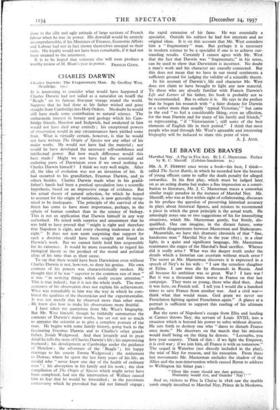CHARLES DARWIN
Charges Darwin: The Fragmentary Man. By Geoffrey West. (Routledge. t5s.)
Ir is interesting to consider what would have happened if Charles Darwin had not sailed as a naturalist on boar2 the ' Beagle ' on its famous five-year voyage round the world. Suppose that he had done as his father wished and gone straight from Cambridge into Holy Orders. No doubt he would still have made some contribution to natural science. The enthusiastic interest in botany and geology which his Cam- bridge friends, Henslow and Sedgwick, had awakened in him would not have died away entirely ; his exceptional powers of observation would in any circumstances have yielded some fruit. What is virtually certain, however, is that he would not have written The Origin of Species nor any other of his major works. He would not have had the material ; nor would he have developed the necessary self-confidence and intellectual power. But how much difference would this have made ? Might we not have had the essential and enduring parts of Darwinism even if we owed nothing to Charles Darwin himself ? I think we very well might. After all, the idea of evolution was not an invention of his. It had occurred to his grandfather, Erasmus Darwin, and to others besides. Charles Darwin made what in his grarid- father's hands had been a poetical speculation into a scientific hypothesis, based on an impressive range of evidence. But his actual theory of natural selection, by which he hoped to account for the origin of variations, is now generally recog- nised to be inadequate. The principle of the .survival of the fittest has come to have more importance, perhaps, in the sphere of human conduct than in the science of biology. This is not an application that Darwin himself in any way authorised. He noted with surprise and amusement that he was held to have proved that " might is right and therefore that Napoleon is right, and every cheating tradesman is also right." It does not now seem surprising that support for such a doctrine should have been sought and found in Darwin's work. But we cannot fairly hold him responsible for its existence. It would be more reasonable to regard his biological theory as the product of the moral and political ideas of his time than as their cause.
To say that there would have been Darwinism even without Charles Darwin is not, however, to deny his genius. His own estimate of his powers was characteristically modest. He thought that if he was " superior to the common run of men " it was " in noticing things which easily escape attention." This is true indeed ; but it is not the whole truth. The mere acuteness of his observation does not explain his achievement. What was remarkable in him was the way in which he com- bined the qualities of the theoretician and the experimentalist. It was not merely that he observed more than other men. . He knew also how to make his observations more fruitful. I have taken my quotations from - Mr. West's biography. But Mr. West himself, though he faithfully summarises the contents of Darwin's major works, has set out not so much to appraise the scientist as to give a complete portrait of the man. He begins with some family history, going back to the fascinating Erasmus Darwin and to Charles's other grand- father, Josiah Wedgwood. And then leisurely and in great detail he tells the story of Charles Darwin's life; his unpromising boyhood ; his development at Cambridge under the guidance of Henslow ; the adventure of the ' Beagle ' ; his happy marriage to his cousin Emma Wedgwood ; the retirement to Downe, where he spent the last forty years of his life, an
invalid who " never knew one day of the health of ordinary
men " ; his absorption in his family and his work ; the slow compilation of The Origin of Species which might never have
been completed, had not the intervention of Wallace caused him to fear that he would be forestalled ; in the passionate controversy which he provoked but did not himself engage;
the rapid extension of his fame. He was essentially a specialist. Outside his subject he had few interests and no original ideas. It is on this account that Mr. West considers him a " fragmentary " man. But perhaps it is necessary in modern science to be a specialist if one is to achieve out- standing results. Certainly I cannot agree with Mr. West that the fact that Darwin was " fragmentary," in his sense, can be used to show that Darwinism is incorrect. No doubt a man's work and his character are causally connected. But this does not mean that we have in our moral sentiments a sufficient ground for judging the validity of a scientific theory. In his account of Darwin's life and character Mr. West does not claim to have brought to light any new material. To those who are already familiar with Francis Darwin's Life and Letters of his father, his book is probably not to be recommended. But to others it is. He says in the preface that he began his research with " a faint distaste for Darwin as a rather more than usually ' typical Victorian,'" but came in the end " to feel a considerable liking, even an affection, for the man Darwin and for many of his family and friends," as representing, " if ' Victorianism ', still some of the best elements of English life in their period." I think that most people who read through Mr. West's agreeable and interesting biography will be induced to share this point of view. A. J. AYER.


































 Previous page
Previous page